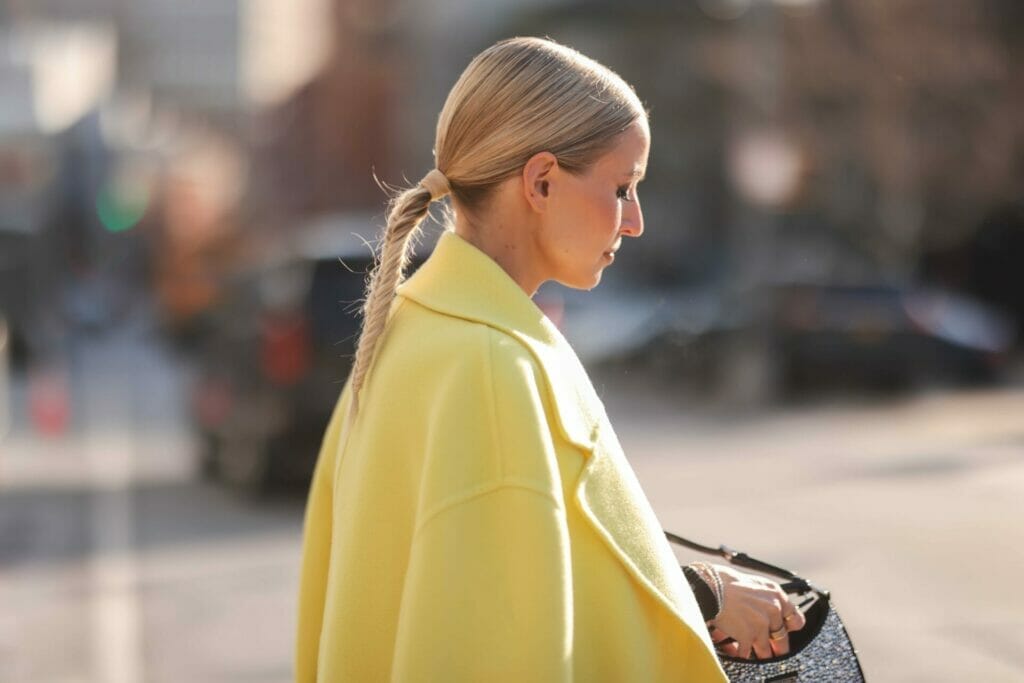
Jeremy Moeller/Getty Images
Words by Bridget March
Your hair is a barometer of your internal wellbeing, often reflecting health conditions or nutritional issues before they present themselves elsewhere. Here a trichologist helps you understand your hair health:
“Hair is a window to your health,” says Anabel Kingsley, a consultant trichologist at the Philip Kingsley Clinic. As a non-essential tissue – meaning hair doesn’t serve a function in keeping us alive – “our strands are often the first part of us our body neglects when anything is amiss internally,” she explains.
“No matter what products you use, if you aren’t eating a healthy balanced diet, or keeping check on your general health and stress levels, your hair’s health isn’t going to be as good as it could be.” With this is mind, if you’re experiencing hair-fall and thinning, or a flaky, itchy scalp, know that your body could be trying to tell you something.
Here, the expert explains the reasons behind the common problems she sees, so you can address your hair health holistically.

Jeremy Moeller/Getty Images
Problem: Excessive daily hair shedding (aka telogen effluvium)
This is a reactive hair loss condition caused by an internal disruption, Kingsley explains. Typically it occurs six to 12 weeks after the event that caused it. “It can be acute (short-lived) or chronic (long-standing and recurring). Acute TE is usually caused by a one-off blip, like the flu, food poisoning or a high fever, and doesn’t require any treatment. However, hair fall that continues or recurs should be thoroughly investigated,” she advises. The most common causes for chronic TE are:
- Iron and ferritin (stored iron) deficiency. This is particularly common in menstruating women, post-surgery and in the postpartum period
- Vitamin B12 and vitamin D deficiency
- Hypo or hyperthyroidism (aka and underactive of overactive thyroid gland)
- High stress levels impacting how your body absorbs nutrients
- Crash dieting and energy deficits (ie not eating enough calories)
- High mercury levels (from eating too much high-mercury fish such as tuna, swordfish and Spanish mackerel)
Problem: Hair thinning (aka androgenic alopecia)
This type of hair loss is slow and progressive. “It is down to genes – specifically having a genetic predisposition that causes hair follicles on your scalp to be sensitive to normal levels of androgens (male hormones),” Kingsley reveals. She explains that when you have this sensitivity, hair follicles on your scalp gradually miniaturise, and produce finer and shorter strands. “While reduced hair volume usually isn’t the sign of a health condition, conditions that impact your hormone levels can make androgenic alopecia worse.” Here are some examples:
- Polycystic Ovarian Syndrome (PCOS). “However, this often is accompanied by other symptoms, such as weight gain, acne, facial hair and irregular periods,” she notes
- Being on an androgenic oral contraceptive, or androgenic HRT
- High stress levels, “which can inadvertently raise androgen levels”
Other health conditions that often cause hair loss include Lupus and Cushing’s Syndrome, Kingsley adds.
Problem: Brittle hair
The growth of weak, brittle hair can be caused by not eating enough protein, the trichologist confirms. “To avoid this, I suggest adding at least a palm-sized portion of protein to your breakfast and lunch.” Good examples are eggs, oily fish, shellfish, lean meat, low-fat cheese, quinoa, tofu and nuts.
She adds that “zinc deficiency and hyperthyroidism can also cause the growth of brittle hair.” Foods high in zinc include oysters, chickpeas, lean sirloin steak, hemp seeds and cashew nuts.
Problem: Flaky, itchy scalp
“While usually not the sole cause of scalp irritation, a lack of omega-3 in your diet can exacerbate scalp conditions,” she reveals. Omega-3 can be found in oily fish such as salmon and mackerel, walnuts, eggs, sprouts and flaxseeds.
“Stress can also cause an itchy scalp,” Kingsley adds. Extreme changes in temperature can also be a factor.

Christian Vierig/Getty Images
A healthy hair diet and the supplements debate
Dr Megan Rossi (PhD, RD, APD), also known as @theguthealthdoctor, tells us that the perfect healthy hair diet is essentially the Mediterranean diet.
“You should aim for an inclusive diet, not a restrictive one,” she says, so avoid cutting out whole food groups. Carbs are important, for example. “Aim for 30 plant-based foods a week, including fruits, veggies, wholegrains, legumes, nuts and seeds.”
While Kingsley advocates eating your nutrients and antioxidants, she believes in taking healthy hair supplements as as a maintenance. “No one eats perfectly the whole time, and those busy days when you’re in too much of a rush to eat a proper lunch, or you grab something easy, but of low nutritional value, can take their toll on your strands,” she says.
“Supplements help to give your hair an extra buffer – which is usually needed! As hair is the last part of you to receive the nutrients you ingest, a healthy diet alone often isn’t enough to keep it functioning at its best.”
However, Rossi notes that you should be mindful of overdoing it with supplements. “Excessive intakes of nutritional supplements may actually cause hair-fall,” she says. “Vitamin A and selenium supplementation have all been linked to hair-fall. So it is important to monitor your nutrient levels with a health professional before taking supplements marketed for hair health.”
Products, prescriptions and professional treatments
For optimum hair health, Kingsley says to treat your scalp as you would the skin on your face. “After all, your scalp is skin – and you take your hair to the same places you take your face.” Your scalp’s health is also instrumental to hair growth, she notes. “Think of your scalp being your hair’s support system.”
At home, take a triple-pronged product approach: a daily scalp toner, and weekly masks for both your scalp and your hair. If hair loss is your concern, add in a fortifying spray to strengthen the hair after washing.
If your scalp needs a thorough cleanse and exfoliation, try booking in a ‘facial’ for it. We recommend the Intensive Hair Spa Treatment at the Philip Kingsley Trichological Clinic in Mayfair; the Pramāsana Scalp Treatment, available at Aveda salons and spas nationwide; and the Kérastase Fusio Scrub treatment, an add-on at the backwash available at Kérastase salons nationwide.
“For a thorough investigation into your hair loss or scalp problem, please visit our London clinic,” Kingsley advises. “As well as examining your hair and scalp, we take a full medical and family history, delve into your diet and lifestyle and send you for comprehensive blood tests.” As a first port of call, talk to your GP if you are concerned about changes in your scalp and hair.
This article originally appeared in harpersbazaar.com



